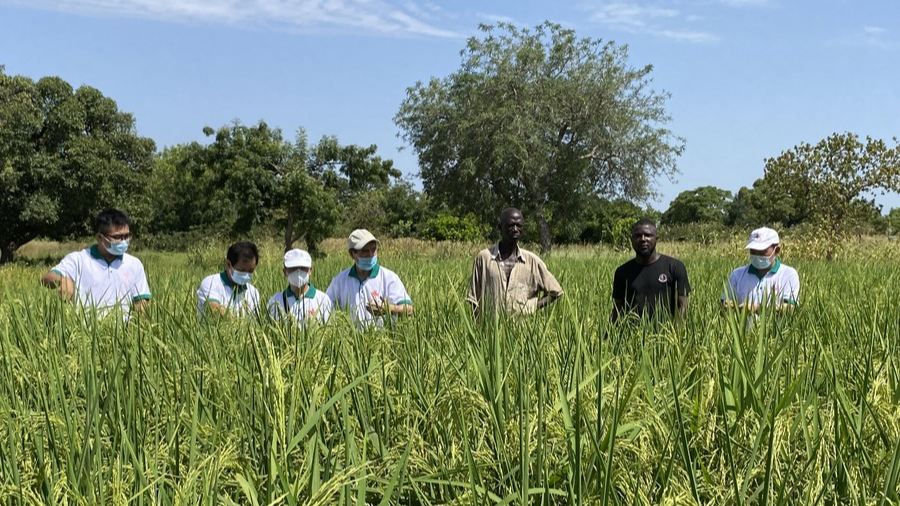
Chinese experts work in a paddy field in the demonstration area of Nariou village in Burkina Faso, July 13, 2021. [Photo/Xinhua]
By Xin Ge
October 17, 2024 marks the 11th China National Poverty Alleviation Day and the 32nd International Day for the Eradication of Poverty. Since the 18th National Congress of the Communist Party of China (CPC) in 2012, the Central Committee of the CPC has prioritized poverty alleviation as a foundational task and a hallmark indicator in its pursuit of the first centenary goal of the Chinese nation, launching a comprehensive battle against poverty across the nation.
On February 25, 2021, Chinese President Xi Jinping announced that China had secured a "complete victory" in the battle of poverty alleviation. With the final 98.99 million rural impoverished residents lifted out of poverty, absolute poverty had been eradicated in the nation.
China's success in eliminating absolute poverty carries significant global implications. The World Bank has set extreme poverty income to measure below $1.9 per day. Over the past four decades, China has lifted around 800 million of its citizens above that threshold, contributing to about 75 percent of the world’s population raised out of extreme poverty. Such an achievement is indeed a miracle for the world.
This remarkable success not only facilitated the attainment of the United Nations Millennium Development Goals but also enabled the country to achieve the United Nations' first Sustainable Development Goal – to "end poverty in all its forms everywhere" – 10 years ahead of its scheduled timeline.
This exceptional progress in poverty reduction in China can be ascribed to a dual strategy: a broad-based economic transformation and the implementation of targeted poverty alleviation policies.
Since the launch of the reform and opening-up policy in 1978, China has undergone decades of rapid economic growth. Together with economic development, China has also focused on education, an outward-oriented development strategy, substantial infrastructure investment, macroeconomic stability and structural policies aligned with comparative advantages. The acceleration of poverty alleviation in China since the 1980s is a testament to its extraordinary economic performance.
Once the poverty rate fell below 10 percent, targeted poverty alleviation strategies and social safety nets began to play increasingly pivotal roles. Initiated in 2013, the targeted poverty alleviation strategy encompasses the entire process from poverty identification to exit, providing detailed frameworks for who receives assistance, who provides it, how aid is dispensed, and how to prevent a return to poverty.
Furthermore, China's poverty alleviation success is underpinned by effective governance. The nation boasts a capable and efficient government that has made credible commitments to poverty reduction goals, promoting coordination among various levels of government and sectors while actively mobilizing non-governmental stakeholders for collaboration.
Another major contribution to China's poverty alleviation efforts is its willingness to share its experiences selflessly with other developing countries, particularly those in Africa. This is exemplified through a number of collaborative project initiatives.
In 2021, Chinese President Xi Jinping announced China would set up China-Africa joint centers for modern agricultural technology exchange, demonstration and training in the nation to promote agriculture modernization in Africa. Three years later, in 2024, President Xi further proposed that 10 partnership actions will be implemented over the next three years to cover a wide range of areas including mutual learning among civilizations, trade prosperity, industrial chain cooperation, and so on.
Moreover, Chinese institutions and enterprises have been encouraged to develop demonstration villages for agricultural development and poverty alleviation in Africa, alongside supporting the initiative "A Hundred Companies in a Thousand Villages" launched by the Alliance of Chinese Companies in Africa for Corporate Social Responsibilities.
Under the poverty reduction and agricultural development program, China has initiated 47 poverty alleviation and agricultural projects that provide technical assistance to Malawi, Burundi and Cote d'Ivoire. With about 9,000 agricultural personnel and 500 agricultural experts sent to Africa, the program has benefited over one million African small-scale farmers, helping the continent to achieve agriculture modernization.
The Forum on China-Africa Cooperation (FOCAC) – particularly the China-Africa Poverty Reduction and Development Conference – has enriched the cooperative framework for poverty alleviation. Since its establishment in 2010, this conference has been convened annually. Officially incorporated into FOCAC in 2015, it has emerged as a vital platform for policy dialogue and the exchange of best practices in poverty alleviation and rural development.
Lastly, the enhancement of capacity-building cooperation between China and African nations remains a top priority. From 2012 to 2021, China held over 130 international training sessions focused on poverty reduction, attended by officials from 116 countries and organizations. Covering a wide array of topics, these specialized training sessions have equipped African policymakers and practitioners with insights and firsthand information drawn from China's experiences.
On September 5, 2024, at the opening ceremony of the 2024 FOCAC summit, President Xi announced the elevation of China-Africa relations to "an all-weather China-Africa community with a shared future for the new era." With the robust backing of over one-third of the global population represented by the Chinese and African peoples, coupled with steadfast leadership from their governments, the new era of China-Africa cooperation in poverty alleviation will make a profound impact on global efforts to eradicate poverty.
Xin Ge, a special commentator on current affairs for CGTN, is a research fellow at the Institute of Public Policy and Governance, Shanghai University of Finance and Economics (SUFE), and an associate professor at the School of Public Economics and Administration, SUFE.

 中文
中文



